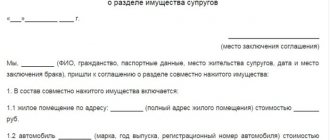4.5 / 5 ( 2 voices)
The issue of filing a claim for the division of property rights between former spouses is regulated by multiple articles of Russian codes. The question of how much state duty is paid when dividing property in 2021, and the procedure for its payment are considered by the Tax Code. Next, we will determine how to calculate the required amount, which categories of citizens are required to pay state duty and who is exempt from this need, as well as methods for making payments.
Who pays the state fee
According to the Tax Code of the Russian Federation, the plaintiff is required to pay the state fee for filing an application for division of marital property. If, when filing a claim, he does not provide a payment document confirming the payment of the required amount, then his claim will simply not be accepted for consideration.
If the plaintiff makes a demand for the division of the spouses’ property, it means that he initially assumes that part of the common property will come into his possession through the court. Such a court decision allows you to include in the claim a petition for the division of state fees between him and the defendant. Then, depending on the shares received in the divisible property, the amount of state duty when making a court decision will be divided.
For example, if its amount was 12 thousand rubles, and 2/3 of the divisible property was awarded to the plaintiff, and 1/3, respectively, to the defendant, then the latter will be charged 8 thousand rubles in favor of the plaintiff from the amount of the duty paid.
How to calculate the state duty
When dividing jointly acquired property, the amount that must be paid as state duty will have to be calculated independently; it is not a fixed amount.
To carry out the calculation procedure, you need to familiarize yourself with the Tax Code of the Russian Federation (primarily Article 333.19). The document states that the amount of the state duty in 2021 directly depends on the value of the property that is supposed to be divided in court.
Claim price up to 20,000 rubles
The first price threshold for value is 20 thousand. If the property is valued at an amount less than that, then to determine the state duty, 4% should be subtracted from it. For example, the price is 17 thousand rubles, which means you need to deposit 680 rubles. It should be taken into account that the minimum state duty is set at 400 rubles.
The cost of the claim is up to 100,000 rubles
With a cost range from 20 thousand to 100 thousand rubles. The calculation occurs according to the following scheme. A fixed price is set at 800 rubles, and from the amount that turns out to be above 20 thousand, they take plus another 3%.
For example, the property is valued at 70 thousand rubles. Then we add 1500 to 800 (3% of 50 thousand), and the result is 2300 rubles.
Claim price up to 200,000 rubles
If the cost threshold exceeds 100 thousand rubles, but does not reach 200 thousand rubles, you should take a fixed amount of 3200 rubles. and add it to 2% of the cost exceeding the lower threshold.
For example, the price is 140 thousand rubles. Then add 800 to 3200 (2% of 40 thousand) and get 4000 rubles. eventually.
The cost of the claim is up to 1,000,000 rubles
If the cost is set at 200 thousand to 1 million rubles, then a fixed amount of 5200 rubles is taken. and 1% is added to it from the part that goes beyond the lower price threshold.
For example, the price is 440 thousand rubles. So, we add 5200 and 4800 (1% of 240 thousand), we get 10,000 rubles. in total.
The cost of the claim is over 1,000,000 rubles
Provided that the price is above 1 million rubles, it is necessary to take a fixed amount of 13,200 rubles. and add to it 0.5% of the cost, which exceeds the threshold of 1 million rubles.
For example, the property is valued at 3 million rubles. In this case, we take 13,200, add 10,000 (0.5% of 2 million), and the result is 23,200 rubles. The law establishes that the maximum amount of state duty is 60 thousand rubles.
If the value of the claim changes during the course of the case
Before filing a claim, the applicant is obliged to determine the value of the divisible property, calculate the estimated amount of the state duty and pay it. When considering a claim, the judge may not be satisfied with the price presented and order an examination to accurately determine it. In this case, the cost may change down or up. This automatically leads to a change in the amount of state duty when dividing property.
The legislative framework
| Name of the normative act | What does it regulate? |
| Family Code of Russia |
|
| Tax Code of Russia (part 2) |
|
| Civil Procedure Code of Russia |
|
| Review of judicial practice of the Supreme Court of Russia No. 1 for 2016 |
|
Who evaluates the property to calculate the claim?
Initially, the value of the property to be divided can be determined by the plaintiff himself. In this matter, he should rely on the agreements under which it was received. If we are talking about real estate, then you need to contact the BTI and request documents indicating the price.
In addition, you should analyze the average market value of similar properties in your region of residence. For example, if we are talking about dividing a car, you need to look at car sales sites and determine the cost of a car with similar characteristics.
How an expert evaluates property during division.
If the parties to the proceeding do not agree on the value of the claim, then an independent appraiser from the SRO may be invited. He conducts an examination and draws up an act indicating the approximate value of the property being divided.
Fictitious debts
Fictitious loans are used by unscrupulous spouses in order to artificially increase the property mass subject to division, and thus increase their share in the division of assets. The scheme works as follows:
- One of the participants in the marriage negotiates with a fictitious creditor without notifying the second spouse and allegedly takes out a loan.
- The spouse enters into a fake loan agreement with the lender.
- An unscrupulous participant in family relations refuses peaceful means of dividing property. In the court hearing, he states that he spent the loan funds on the needs of the family.
- The burden of proving bad faith falls on the other spouse, who cannot prove malice on the part of the other party to the lawsuit because he or she does not have the necessary documents.
- As a result, the judge includes the fictitious debt in the joint property. Thus, after the decision is made, the attacker receives more property than he is entitled to by law.
To combat offenders and to prevent further use of this fraudulent scheme, the Supreme Court of Russia ruled that the obligation to prove the fact of spending borrowed funds on family needs should be assigned to the borrower, and not to the second spouse, who often does not know about the existence of the loan.
Procedure for paying state duty when dividing property
The required amount of money must be paid by the plaintiff before filing an application for division of jointly acquired property. He needs to attach payment documents to the claim. Otherwise, it will not be accepted for consideration in the court office.
Where to get details
To pay the required amount of state duty, payment details are required. For information, you should contact the court where you intend to file your claim directly. This will be either a magistrate's court or a city (district) court. Perhaps the necessary information is posted on the official website of the judicial organization.
How to pay
There are several ways to pay state duty:
- Payment via bank teller. This is a standard method in which you simply need to provide the cashier with your payment details and the required amount of money.
- Payment using a bank terminal. It's easy to do, you just need to enter your payment details and ID details.
- Transfer funds using an electronic wallet. The procedure is available to persons who have their own electronic wallet (Qiwi, Yandex Money, WebMoney) and the required amount in it.
Receipt for confirmation
If payment is made through a cash register, the bank teller will issue a receipt. When depositing funds through the terminal, after the money is accepted by the bill acceptor, the machine issues the necessary receipt. When payment is made online, you need to print out a receipt yourself, which the electronic wallet sends by e-mail. It is these payment receipts that should be attached to the claim for the division of jointly acquired property in 2021.
Subtleties of interaction with banks
If, during a divorce, spouses plan to share mortgaged housing or large movable property purchased with credit money, then they must notify the banking organization about the start of the divorce process. The fact is that when dividing debts between participants in a marriage union, the property interests of the bank may be affected. Accordingly, the risk of non-payment of credit debt by spouses increases.
For this reason, banking institutions usually do not agree to re-issue a loan agreement concluded in the name of one spouse and enter into two separate agreements with each of the former spouses. Courts do not have the power to force a credit institution to replace one borrower with two, since the decision to change borrowers in a debt obligation is made by the creditor independently.
In this situation there are two possible solutions:
- Immediately execute a loan transaction for both spouses.
- The spouse who is not the borrower transfers the monetary compensation agreed upon with the second spouse or accrued by the court to the borrower spouse for his share of the property. This compensation is equal to the share of the debt determined by agreement of the participants in the marriage union or by the court.
It is necessary to take into account the fact that many credit organizations, when issuing mortgage loans, insist that one of the spouses become the guarantor of the other. If the text of the contract states that the guarantee cannot be terminated even in the event of divorce, then even the court will not be able to change such a condition of the transaction. Possible solutions for the guarantor in this case are:
- Help the borrower pay off the debt.
- If the bank agrees, then agree on replacing the guarantor with a third party.
Deferment and installment payment
If the plaintiff has serious financial difficulties, then he has the right to file a petition for an installment payment plan. Those. he will have to pay a certain amount (for example, 1000 rubles), and the remaining parts will be collected within a certain period of time established by the court. There are a number of reasons why installments may be granted:
- low income;
- presence of disabled dependents;
- loss of source of income;
- the presence of a serious illness requiring expensive treatment;
- pensioner status.
The list of reasons is more extensive. It is advisable to obtain advice from the court in each specific case. In a number of cases, by a court decision, these groups of citizens may be provided not only with installment payments, but also with a reduction in the amount of state duty.
Who should pay the state fee?
One of the spouses Share equally
The plaintiff, when filing a request for an installment plan, must understand that granting it is not an obligation, but a right of the judge.
Refund of state duty when dividing joint property
The law provides several reasons why the amount paid as state duty may be returned to the payer:
- if, after filing the claim, the judge made a decision to refuse to consider the case;
- when the court returns the statement of claim to the plaintiff;
- in case of termination of legal proceedings in the case;
- if it has been established that the price of the claim is lower and the amount of the state duty paid is greater than required by law. Then the difference in amounts is returned.
To return the required amount, you must first submit an application to the court office. The plaintiff will be provided with a response within 15 days. If the claim is found to be valid, the applicant will be issued a resolution, which must be submitted to the Tax Service. The Federal Tax Service is obliged to transfer the required amount to the plaintiff within a month after receipt of the application.







